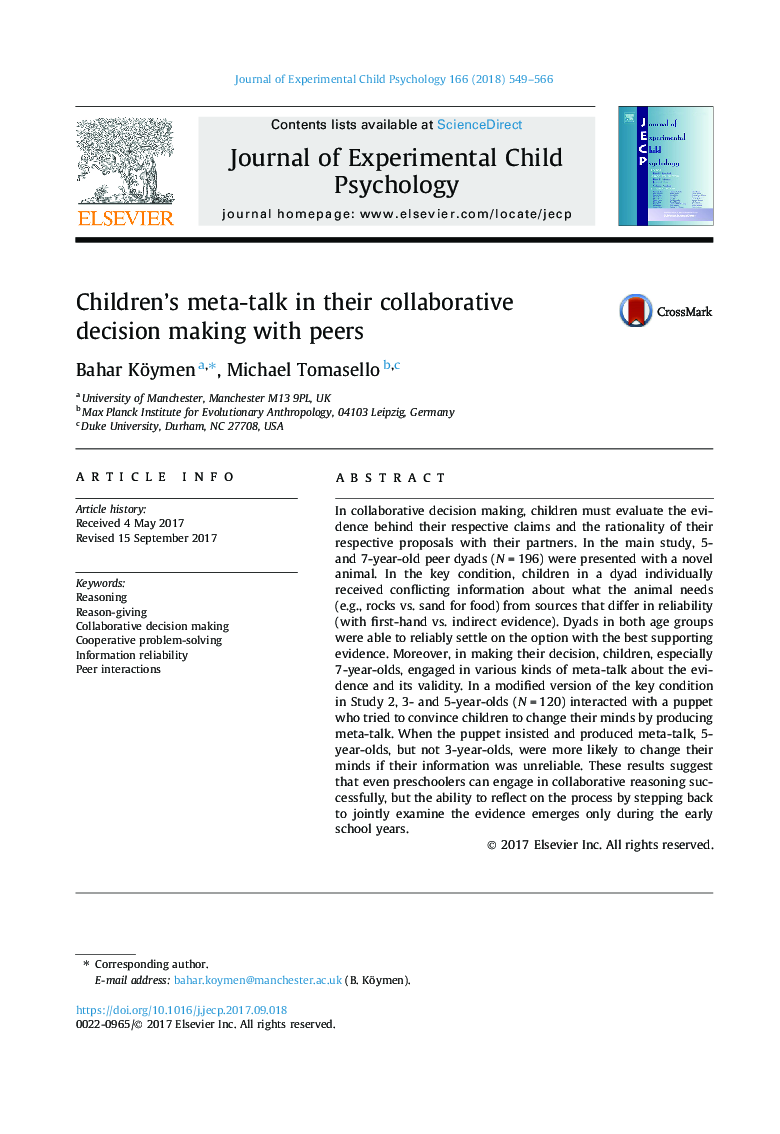| کد مقاله | کد نشریه | سال انتشار | مقاله انگلیسی | نسخه تمام متن |
|---|---|---|---|---|
| 7274254 | 1473446 | 2018 | 18 صفحه PDF | دانلود رایگان |
عنوان انگلیسی مقاله ISI
Children's meta-talk in their collaborative decision making with peers
ترجمه فارسی عنوان
بحث فراگیر کودکان در تصمیم گیری مشترک آنها با همسالان
دانلود مقاله + سفارش ترجمه
دانلود مقاله ISI انگلیسی
رایگان برای ایرانیان
کلمات کلیدی
استدلال دلیل دادن تصمیم گیری همکاری همکاری حل مسئله، قابلیت اطمینان اطلاعات، تعاملات همکار،
موضوعات مرتبط
علوم انسانی و اجتماعی
روانشناسی
روانشناسی رشد و آموزشی
چکیده انگلیسی
In collaborative decision making, children must evaluate the evidence behind their respective claims and the rationality of their respective proposals with their partners. In the main study, 5- and 7-year-old peer dyads (Nâ¯=â¯196) were presented with a novel animal. In the key condition, children in a dyad individually received conflicting information about what the animal needs (e.g., rocks vs. sand for food) from sources that differ in reliability (with first-hand vs. indirect evidence). Dyads in both age groups were able to reliably settle on the option with the best supporting evidence. Moreover, in making their decision, children, especially 7-year-olds, engaged in various kinds of meta-talk about the evidence and its validity. In a modified version of the key condition in Study 2, 3- and 5-year-olds (Nâ¯=â¯120) interacted with a puppet who tried to convince children to change their minds by producing meta-talk. When the puppet insisted and produced meta-talk, 5-year-olds, but not 3-year-olds, were more likely to change their minds if their information was unreliable. These results suggest that even preschoolers can engage in collaborative reasoning successfully, but the ability to reflect on the process by stepping back to jointly examine the evidence emerges only during the early school years.
ناشر
Database: Elsevier - ScienceDirect (ساینس دایرکت)
Journal: Journal of Experimental Child Psychology - Volume 166, February 2018, Pages 549-566
Journal: Journal of Experimental Child Psychology - Volume 166, February 2018, Pages 549-566
نویسندگان
Bahar Köymen, Michael Tomasello,
